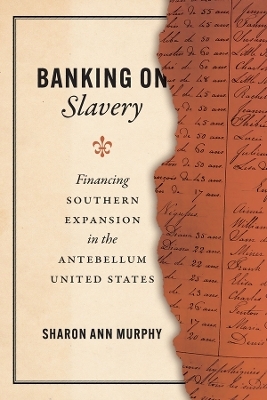
Banking on Slavery
University of Chicago Press (Verlag)
978-0-226-82513-7 (ISBN)
It’s now widely understood that the fullest expression of nineteenth-century American capitalism was found in the structures of chattel slavery. It’s also understood that almost every other institution and aspect of life then was at least entangled with—and often profited from—slavery’s perpetuation. Yet as Sharon Ann Murphy shows in her powerful and unprecedented book, the centrality of enslaved labor to banking in the antebellum United States is far greater than previously thought.
Banking on Slavery sheds light on precisely how the financial relationships between banks and slaveholders worked across the nineteenth-century South. Murphy argues that the rapid spread of slavery in the South during the 1820s and ’30s depended significantly upon southern banks’ willingness to financialize enslaved lives, with the use of enslaved individuals as loan collateral proving central to these financial relationships. She makes clear how southern banks were ready—and, in some cases, even eager—to alter time-honored banking practices to meet the needs of slaveholders. In the end, many of these banks sacrificed themselves in their efforts to stabilize the slave economy. Murphy also details how banks and slaveholders transformed enslaved lives from physical bodies into abstract capital assets. Her book provides an essential examination of how our nation’s financial history is more intimately intertwined with the dehumanizing institution of slavery than scholars have previously thought.
Sharon Ann Murphy is professor of history at Providence College.
List of Illustrations
Introduction: Banking in the Nation’s Largest Slave Market
Part I: Financing Southwestern Expansion through the 1810s
1 The Limits of Early Bank Financing of Slavery
2 Adapting Slave Financing to the Needs of the Frontier South during the Nation’s First Boom and Bust
Part II: Financing an Empire of Slavery in the 1820s and 1830s
3 Old South Banks and Frontier Finance
4 Pushing Financial Boundaries with Traditional Banks
5 Reimagining Banking for a Slave Economy
Part III: The Collateral Damage of the Panics of 1837 and 1839
6 Foreclosing (or Not) on Delinquent Slaveholders
7 Escaping Debt: Bankruptcy, Fraud, and Going to Texas
8 When Banks Fail
9 From Commercial Banking to Private Finance
Epilogue: Banks, Debt, Emancipation, Reparations, and Memory
Acknowledgments
Abbreviations
Notes
Index
| Erscheinungsdatum | 06.03.2023 |
|---|---|
| Reihe/Serie | American Beginnings, 1500-1900 |
| Zusatzinfo | 17 halftones, 1 line drawings, 8 tables |
| Sprache | englisch |
| Maße | 152 x 229 mm |
| Gewicht | 594 g |
| Themenwelt | Geisteswissenschaften ► Geschichte ► Regional- / Ländergeschichte |
| Geschichte ► Teilgebiete der Geschichte ► Kulturgeschichte | |
| Geschichte ► Teilgebiete der Geschichte ► Militärgeschichte | |
| Geschichte ► Teilgebiete der Geschichte ► Wirtschaftsgeschichte | |
| ISBN-10 | 0-226-82513-2 / 0226825132 |
| ISBN-13 | 978-0-226-82513-7 / 9780226825137 |
| Zustand | Neuware |
| Haben Sie eine Frage zum Produkt? |
aus dem Bereich


